
What are Hedge Funds and How do they work?
Like many other financial concepts, Hedge funds are new to some, known to some, and some are in the middle. Well, Secvolt today is here to help. Today, we will discuss hedge funds in detail. So, whichever side you are on right now, after reading this, you will have a detailed overview of hedge funds.
Let us start with a basic understanding of the concept or how a wealth management company would put it. What are hedge funds? To understand the same, let us break it down- hedge & funds. What is hedging? Hedging is one of the risk management strategies which refers to buying or selling an investment to help reduce a risk already existing in another investment option. And funds, as we all know, are like pools- money gets contributed towards these. Thus, what would a hedge fund be? A hedge fund is an investment fund formed as a private limited partnership that involves buying or selling investment options, and that too through ‘funds’ or pooled capital. And why are these different investment strategies? To make extraordinary profits!
You must be wondering now where’s the catch. Let’s have a look at it in the next section.
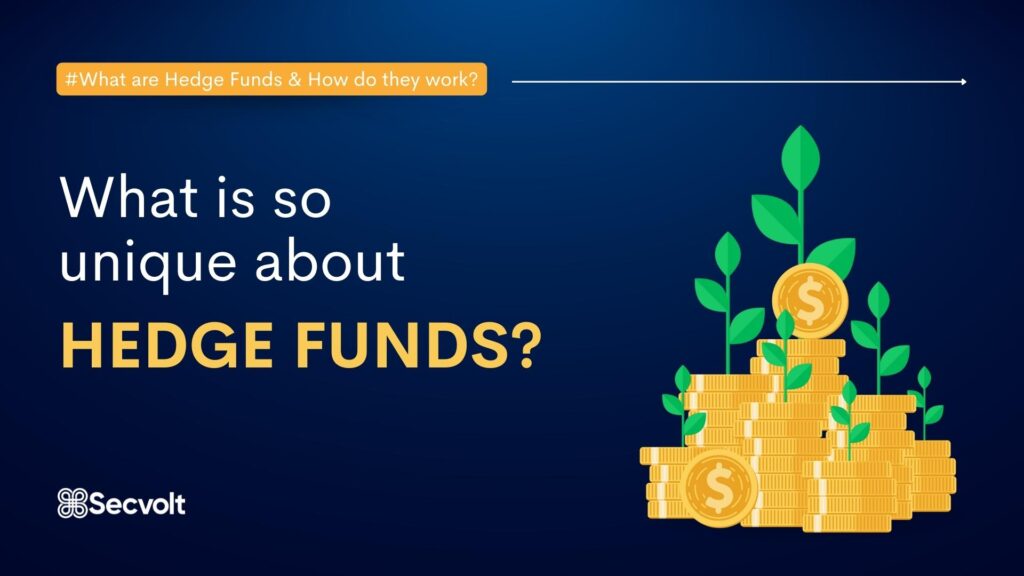
What is so unique about hedge funds?
You have gotten everything in the definition- pooled funds, risk management strategy, buying & selling, but there has to be something, right? There is a catch! Well, hedge funds can only issue securities privately to ‘qualified’ investors. By qualified, we mean hedge fund investors who qualify for a hedge fund. Each hedge fund has a ticket size of its own, a minimum required investment value that is usually higher than the other rates & funds in the market. Now, when they have an extraordinary ticket size, they use such complex trading patterns and deliver such performances too. In a gist, this is what is different with hedge funds. We will have a deeper look in the coming sections. Let us first discuss who invented the idea of hedge funds.
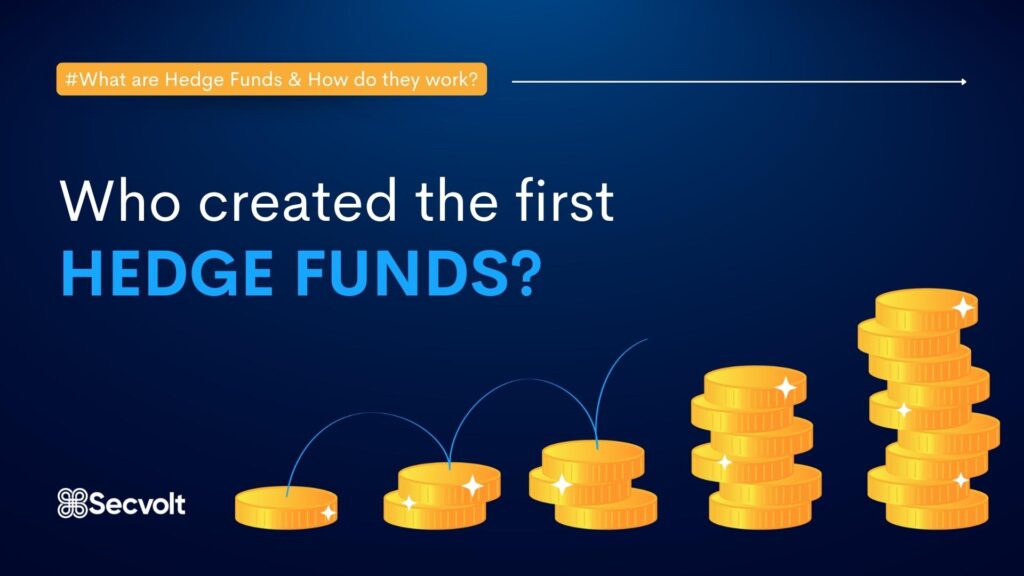
Who created the first hedge fund?
For all those investment management companies, Alfred Winslow Jones is the father of the hedge fund industry. He founded the first hedged fund. Jones didn’t exactly think of it as what it is today. He wanted to create a ‘hedge’ through shorting & leveraging strategies. These hedge fund strategies are used amongst wealth management companies today, but back then, they were new. And they worked tremendously well. And that’s how the world’s first ‘hedged fund’ was created. It dates back to the year 1949. So, hedge funds today are more than 70 years old. And over this period, many techniques have come & gone, tried, tested & applied, but it goes on & on.
Now, you know a little about what it is, when it started, and who first started it. Let us look at some of the features of hedge funds.
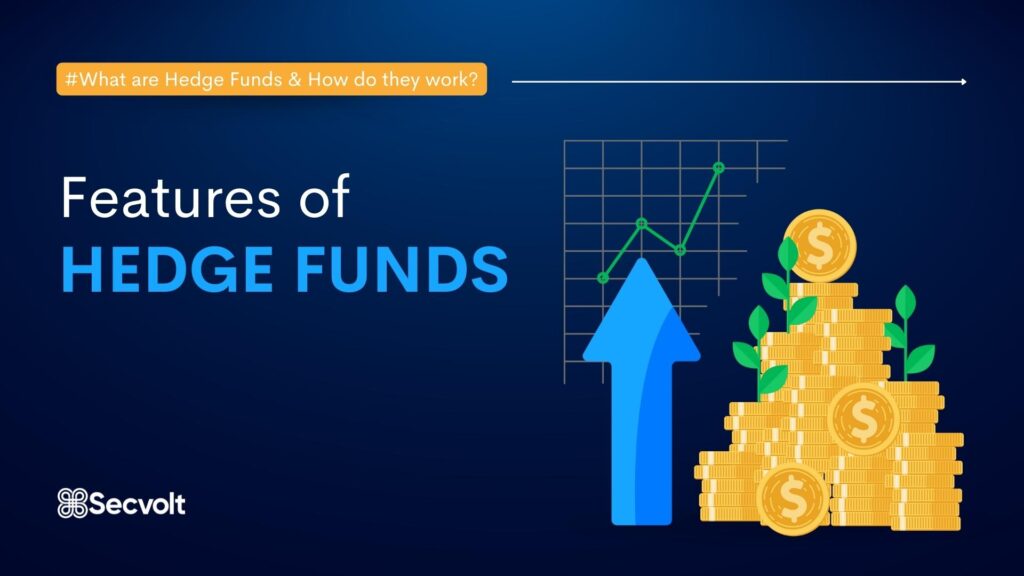
Features of Hedge Funds:
Here, we will discuss some characteristics of hedge funds. Following are some basic features of hedge funds:
-
- Little liquidity- There is a limit to how much money you can withdraw if you have invested in a hedge fund. And this is at any given point in time. Different companies have different policies.
- Minimum Investment Cap- As mentioned earlier, only certain people are eligible or ‘qualified’ to become partners or investors in a hedge fund. These include high-net-worth individuals (HNIs), banks, firms, and enterprises.
- Extraordinary Profits- Hedge funds use different techniques and have various properties. All for what? What is the end goal here? Well, all this is to make extraordinary profits. Giving their clients hefty profits is the goal of these wealth management companies & investment management companies.
- Diversified Portfolio– As mentioned earlier, these use hedge fund strategies that use non-traditional assets too. Anything that gives the best possible returns makes it to the portfolio. And that is what leads to a diversified portfolio. Fund managers go for equity funds, derivatives, leverages, and whatnot.
- High Risk- Higher returns also come with higher risk. Hefty profits can also mean heavy losses sometimes. Since hedge funds involve unconventional methods sometimes, the risk generally remains high. Thus, along with higher profits, the risk factor becomes a feature of the hedge funds.
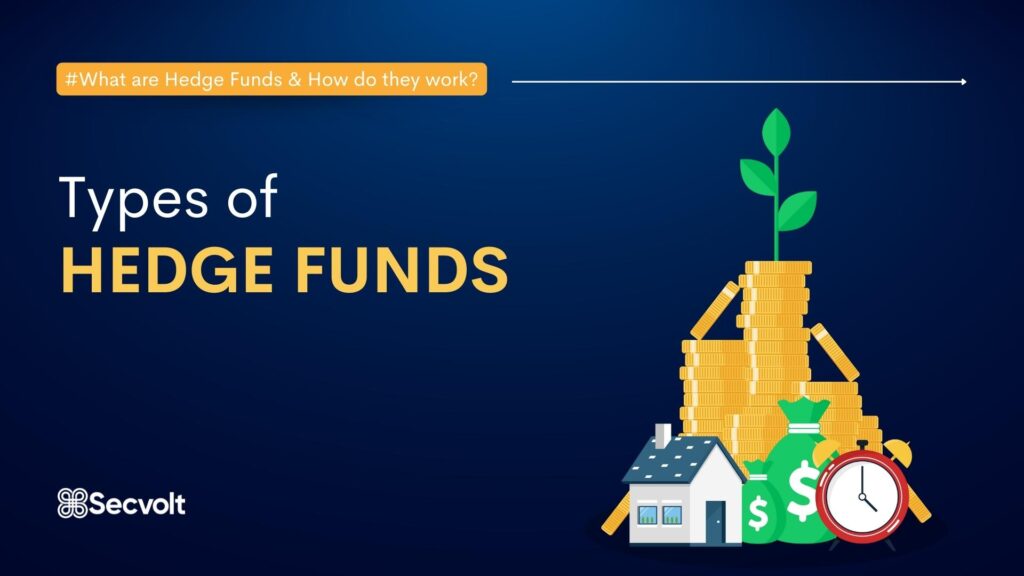
We have looked at some of the basic features. Let us move on to the hedge fund types now.
Types of Hedge Funds:
There are various types of hedge funds. Based on the investment types, funds, and gains, hedge funds mainly fall into four types. Have a look at the following to understand the different types:
-
- Global Macro Hedge Funds- The littlest shift in the air can affect investments and the market. Everybody is talking about these Global macro hedge funds lately. Well, it is because these funds potentially manipulate the market fluctuations caused due to the political or economic environment.
- Equity Hedge Funds- These involve hedging against the falls in the equity market and putting money in lucrative stocks. And how do they hedge? By applying the strategy of shorting the over-valued margins. These might be global or exclusively for a single country.
- Relative Value Hedge Funds- As the name suggests, these hedge funds take advantage of the differences in the prices of other securities. It is why these are relative value hedge funds. They manipulate the shortcomings of price or related value.
- Activist Hedge Funds- Their aim includes undertaking such steps and investing in businesses that increase the stock price. These steps can involve anything from cost-cutting to diversifying asset allocation to reappointing the top management personnel.
So, these were some of the hedge fund types. We will have another level on the same in the examples of the hedge fund section. Next, let us discuss some of the strategies.
If you need some ideas about what to read next, here they are:

Hedge Fund Strategies:
We have seen the concept of hedge funds, their history, features, and types. It is time we have a look at various strategies. Multiple investment management companies use these hedge fund strategies to give their clients the best returns. One has to consider factors like risk tolerance, investment types, investment styles, securities, and goals while selecting the best strategy for their enterprise. Let’s see what some of the hedge fund strategies are:
-
- Long-short hedge fund strategy- Under this strategy, investors compare two companies- their values, policies, and investment grounds. Then they decide to either long or short the stocks, depending upon the valuation. This strategy is an extension of pairs trading, yet another concept.
- Fixed Income hedge fund strategy- As the name suggests, this strategy revolves around fixed income assets or securities. It targets saving capital via both long & short positions in the fixed assets. And through the same, it provides advanced returns to the investors.
- Event-driven hedge fund strategy- Many events take place in the corporate sector, having a temporary or permanent effect on the overall functioning of the other concepts. Some examples of such events are takeovers, mergers & acquisitions, mispricing of shares, and bankruptcy. Strategies that take temporary or permanent advantages of such situations are known as event-driven hedge fund strategies.
- Global-Macro hedge fund strategy- Macro is a part of economics that is the line of study of economic principles internationally. Now, as the name suggests, this hedge fund strategy is formulated based on the political & economic perspectives of different countries & their macroeconomic fundamentals.
So, these are some types of strategies used in hedge funds. If applied correctly, these help them operate better to produce maximum returns.
After covering the strategies, let us move on to the benefits that hedge funds have in the next section.
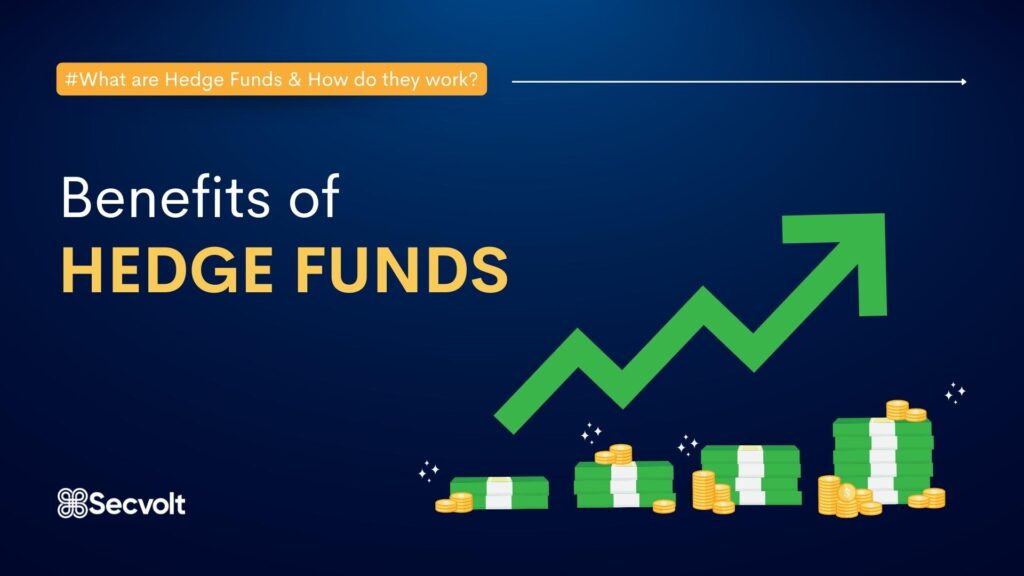
Benefits of Hedge Funds:
You have seen the features of hedge funds, hedge fund types, and hedge fund strategies. Now, let’s have a look at what hedge funds hold for hedge fund investors:
-
- High returns, irrespective of the market situation- Hedge funds mostly give their investors high returns, whether the market is rising or falling. Thus, this is an advantage because they come with some assurance.
- Variety in the portfolio- One of the characteristics of hedge funds is that a diverse portfolio is maintained in a balanced manner here. Diversification & a variety in the portfolio gives multiple other benefits as well.
- Reduction in volatility- Volatility or instability are some things that run hand-in-hand with the markets. Anything that reduces volatility is a great advantage because everyone aims for stability here. Having a diverse & balanced portfolio reduces the risk and volatility, thus making it a benefit for hedge fund investors.
- Qualified fund managers- Let us all agree that no one can beat the finesse that comes with practice and experience. All these wealth management companies, hedge funds, or investment management companies have trained & qualified professionals whose job is to look after the nitty-gritty of your investments. And as said, that gives all the hedge fund types leverage over the other investment types.
- The privilege of choice- Another advantage of hedge funds investment is the hedge fund investors get to choose & customize their investment pattern. In turn, this reflects on their portfolio.
So, these are some of the benefits of hedge funds. Now, let us understand how hedge funds make money.

How do hedge funds make money?
Hedge funds today have a 2:20 fee model, wherein 2% is the fees charged for management, and 20% is on performance. What hedge funds generally do is charge two percent of the NAV(Net Asset Value) of every investor’s shares. This fee covers management expenses like remunerating the fund manager. And the 20% is charged on the performance or profits made in the entire year.
So, this 2% on NAV & 20% on profits combined is how these hedge funds make money and cover their operational & miscellaneous costs.
Let us now have a look at some hedge fund examples and who are the top runners in this advanced industry.

Top performers in the industry:
Below is the list of hedge funds that currently are the biggest of their kind:
-
- Black Rock Advisors
- AQR Capital Management
- Bridgewater Associates
- Davidson Kempner Capital Management
- Man Group
- Elliott Management
- Renaissance Technologies
- Two Sigma Investments
- Millennium Management
- Citadel Advisors
These are the top 10 runners in the industry today. As mentioned, you need a minimum investment cap to invest with hedge funds. Well, till then, we have an alternative investment management company for you that gives you all the benefits that come along with hedge funds. Let us have a look.

Secvolt
Secvolt (https://secvolt.com/) is a global investment management company that gives you the advantages of a hedge fund and more. Here, you don’t just earn advanced returns on your investments but have the privilege of choosing your degree of risk. A highly qualified & well-experienced team manages & customizes your portfolio to give you the best possible services and add meaning to your pockets. We protect & grow your wealth by leaps & bounds and give you a high-quality investment experience.
Try this premium risk assessor today ( https://calculator.secvolt.com/ ) and calculate all the inherent risks in your portfolio. You will observe the difference yourself.






